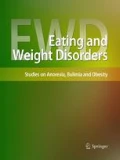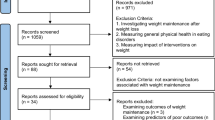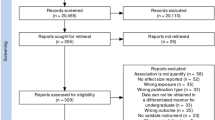Abstract
Purpose
The purpose of this study was to explore further whether depression is associated with problematic eating behaviors in a sample of Turkish bariatric surgery candidates.
Methods
This descriptive study included 168 consecutively seen bariatric surgery candidates in a university bariatric surgery outpatient. Participants were asked to complete the Dutch Eating Behavior Questionnaire (DEBQ), the Beck Depression Inventory (BDI) and surveys assessing sociodemographic and clinical variables. Correlations and linear regression analyses were performed to evaluate the relationship between clinical and demographic variables.
Results
Participants had a mean age 37.7 ± 11.3 years and BMI of 46.4 ± 6.7 kg/m2 (SD = 6.7). According to BDI scores, 75.5 % of the patients had mild, moderate, or severe depressive symptomatology. Lower levels of depressive symptoms were associated with higher levels of restrictive eating (r = −0.17; p = 0.04), whereas higher levels of depressive symptoms were associated with more frequent eating in response to both internal (r = 0.3; p = 0.002) and external (r = 0.2; p = 0.04) cues. The BDI scores were significantly associated with increased external eating (ß = 0.03, p < 0.02) and emotional eating (ß = 0.03, p < 0.002) scores. BMI (β = −0.02, p = 0.02 > 0.1) was not associated with DEBQ total scores.
Conclusions
This research suggests that mild, moderate or severe depressive symptoms are observed in most of the bariatric surgical candidate patients. There is a positive correlation between severity of depression and emotional/external eating behaviors, and a negative correlation between severity of depression and restrictive eating behavior. Additional research is needed to determine whether treating depression preoperatively can assist with alleviating problematic eating behaviors.
Similar content being viewed by others
References
Magro DO, Geloneze B, Delfini R, Pareja BC, Callejas F, Pareja JC (2008) Long-term weight regain after gastric bypass: a 5-year prospective study. Obes Surg 18(6):648–651. doi:10.1007/s11695-007-9265-1
Malik S, Mitchell JE, Engel S, Crosby R, Wonderlich S (2014) Psychopathology in bariatric surgery candidates: a review of studies using structured diagnostic interviews. Compr Psychiatry 55(2):248–259. doi:10.1016/j.comppsych.2013.08.021
Onyike CU, Crum RM, Lee HB, Lyketsos CG, Eaton WW (2003) Is obesity associated with major depression? Results from the Third National Health and Nutrition Examination Survey. Am J Epidemiol 158(12):1139–1147. doi:10.1093/aje/kwg275
Kalarchian MA, Marcus MD, Levine MD, Courcoulas AP, Pilkonis PA, Ringham RM, Soulakova JN, Weissfeld LA, Rofey DL (2007) Psychiatric disorders among bariatric surgery candidates: relationship to obesity and functional health status. Am J Psychiatry 164(2):328–334
Mitchell JE, Selzer F, Kalarchian MA, Devlin MJ, Strain GW, Elder KA, Marcus MD, Wonderlich S, Christian NJ, Yanovski SZ (2012) Psychopathology before surgery in the longitudinal assessment of bariatric surgery-3 (LABS-3) psychosocial study. Surg Obes Relat Dis 8(5):533–541. doi:10.1016/j.soard.2012.07.001
Dawes AJ, Maggard-Gibbons M, Maher AR, Booth MJ, Miake-Lye I, Beroes JM, Shekelle PG (2016) Mental health conditions among patients seeking and undergoing bariatric surgery: a meta-analysis. JAMA 315(2):150–163. doi:10.1001/jama.2015.18118
Kalarchian MA, Marcus MD, Levine MD, Soulakova JN, Courcoulas AP, Wisinski MS (2008) Relationship of psychiatric disorders to 6-month outcomes after gastric bypass. Surg Obes Relat Dis 4(4):544–549. doi:10.1016/j.soard.2008.03.003
de Zwaan M, Enderle J, Wagner S, Mühlhans B, Ditzen B, Gefeller O, Mitchell JE, Müller A (2011) Anxiety and depression in bariatric surgery patients: a prospective, follow-up study using structured clinical interviews. J Affect Disord 133(1–2):61–68. doi:10.1016/j.jad.2011.03.025
Luppino FS, de Wit LM, Bouvy PF, Stijnen T, Cuijpers P, Penninx BW, Zitman FG (2010) Overweight, obesity, and depression: a systematic review and meta-analysis of longitudinal studies. Arch Gen Psychiatry 67(3):220–229. doi:10.1001/archgenpsychiatry.2010.2
Lindeman M, Stark K, Keskivaara P (2001) Continuum and linearity hypotheses on the relationship between psychopathology and eating disorder symptomatology. Eat Weight Disord 6(4):181–187
van Strien T, Ouwens MA (2007) Effects of distress, alexithymia and impulsivity on eating. Eat Behav 8(2):251–257. doi:10.1016/j.eatbeh.2006.06.004
Hallings-Pott C, Waller G, Watson D, Scragg P (2005) State dissociation in bulimic eating disorders: an experimental study. Int J Eat Disord 38(1):37–41. doi:10.1002/eat.20146
Heatherton TF, Baumeister RF (1991) Binge eating as escape from self-awareness. Psychol Bull 110(1):86–108. doi:10.1037/0033-2909.110.1.86
Schachter S, Rodin J (1974) Obese humans and rats. Lawrence Erlbaum Associates Publisher, Maryland, pp 126–129
Herman CP, Polivy J (1980) Restrained eating. In: Stunkard A (ed) Obesity. Saunders, Philadelphia, pp 208–225
Polivy J, Herman CP, Warsh S (1978) Internal and external components of emotionality in restrained and unrestrained eaters. J Abnorm Psychol 87(5):497–504. doi:10.1037/0021-843X.87.5.497
Beck AT, Steer RA, Ball R, Ranieri W (1996) Comparison of Beck Depression Inventories-IA and -II in psychiatric outpatients. J Pers Assess 67:588–597
Beck AT, Steer RA (1984) Internal consistencies of the original and revised Beck Depression Inventory. J Clin Psychol 40(6):1365–1367
Kapci EG, Uslu R, Turkcapar H, Karaoglan A (2008) Beck Depression Inventory II: evaluation of the psychometric properties and cut-off points in a Turkish adult population. Depress Anxiety 25:104–110. doi:10.1002/da.20371
Beck AT, Steer RA, Garbin GM (1988) Psychometric properties of the Beck Depression Inventory: twenty-five years of evaluation. Clin Psychol Rev 8:77–100
Hayden MJ, Brown WA, Brennan L, O’Brien PE (2012) Validity of the Beck Depression Inventory as a screening tool for a clinical mood disorder in bariatric surgery candidates. Obes Surg 22:1666–1675. doi:10.1007/s11695-012-0682-4
Van Strien T, Frijers J, Bergers G, Defares P (1986) The Dutch Eating Behaviour Questionnaire (DEBQ) for assessment of the restrained emotional and external eating. Int J Eat Disord 5:195–217. doi:10.1002/1098-108X(198602)5:2<295::AID-EAT2260050209>3.0.CO;2-T
Wardle J (1987) Eating style: a validation study of the Dutch Eating Behaviour Questionnaire in normal subjects and women with eating disorders. J Psychosom Res 31(2):161–169. doi:10.1016/0022-3999(87)90072-9
Bozan N, Bas M, Asci FH (2011) Psychometric properties of Turkish version of Dutch Eating Behaviour Questionnaire (DEBQ). A preliminary results. Appetite 56(3):564–566. doi:10.1016/j.appet.2011.01.025
Sarwer DB, Cohn NI, Gibbons LM, Magee L, Crerand CE, Raper SE, Rosato EF, Williams NN, Wadden TA (2004) Psychiatric diagnoses and psychiatric treatment among bariatric surgery candidates. Obes Surg 14(9):1148–1156. doi:10.1381/0960892042386922
Lin HY, Huang CK, Tai CM, Lin HY, Kao YH, Tsai CC, Hsuan CF, Lee SL, Chi SC, Yen YC (2013) Psychiatric disorders of patients seeking obesity treatment. BMC Psychiatry 2(13):1. doi:10.1186/1471-244X-13-1
Wardle J, Marsland L, Sheikh Y, Quinn M, Fedoroff I, Ogden J (1992) Eating style and eating behaviour in adolescents. Appetite 18(3):167–183. doi:10.1016/0195-6663(92)90195-C
Vinai P, Da Ros A, Cardetti S, Casey H, Studt S, Gentile N, Tagliabue A, Vinai L, Vinai P, Bruno C, Mansueto G, Palmieri S, Speciale M (2016) The DSM-5 effect: psychological characteristics of new patients affected by Binge Eating Disorder following the criteria of the DSM-5 in a sample of severe obese patients. Eat Weight Disord 21(1):107–113. doi:10.1007/s40519-015-0218-8
Geliebter A, Aversa A (2003) Emotional eating in overweight, normal weight, and underweight individuals. Eat Behav 3(4):341–347. doi:10.1016/S1471-0153(02)00100-9
Canetti L, Berry EM, Elizur Y (2009) Psychosocial predictors of weight loss and psychological adjustment following bariatric surgery and a weight-loss program: the mediating role of emotional eating. Int J Eat Disord 42:109–117. doi:10.1002/eat.20592
Mason TB, Lewis RJ (2014) Profiles of binge eating: the interaction of depressive symptoms, eating styles, and body mass index. Eat Disord 22(5):450–460. doi:10.1080/10640266.2014.931766
Wardle J, Beales S (1987) Restraint and food intake: an experimental study of eating patterns in the laboratory and in normal life. Behav Res Ther 25(3):179–185. doi:10.1016/0005-7967(87)90044-1
Pinaquy S, Chabrol H, Simon C, Louvet JP, Barbe P (2003) Emotional eating, alexithymia, and binge-eating disorder in obese women. Obes Res 11(2):195–201. doi:10.1038/oby.2003.31
Fereidouni F, Atef-Vahid MK, Fathali Lavasani F, Jamshidi Orak R, Klonsky ED, Pazooki A (2015) Are Iranian obese women candidate for bariatric surgery different cognitively, emotionally and behaviorally from their normal weight counterparts? Eat Weight Disord 20(3):397–403. doi:10.1007/s40519-014-0168-6
Davis C, Levitan RD, Carter J, Kaplan AS, Reid C, Curtis C, Patte K, Kennedy JL (2008) Personality and eating behaviors: a case-control study of binge eating disorder. Int J Eat Disord 41(3):243–250. doi:10.1002/eat.20499
Schachter S, Rodin J (1974) Obese humans and rats. Lawrence Erlbaum Associates Publisher, Maryland, pp 81–85
Jansen A, Havermans R, Nederkoorn C, Roefs A (2008) Jolly fat or sad fat? Subtyping non-eating disordered overweight and obesity along an affect dimension. Appetite 51(3):635–640. doi:10.1016/j.appet.2008.05.055
Zijlstra H, van Middendorp H, Devaere L, Larsen JK, van Ramshorst B, Geenen R (2012) Emotion processing and regulation in women with morbid obesity who apply for bariatric surgery. Psychol Health 27(12):1375–1387. doi:10.1080/08870446.2011.600761
Canetti L, Bachar E, Berry EM (2002) Food and emotion. Behav Processes 60(2):157–164. doi:10.1016/S0376-6357(02)00082-7
Author information
Authors and Affiliations
Corresponding author
Ethics declarations
Funding
There was no specific funding for this study.
Conflict of interest
On behalf of all authors, the corresponding author states that there is no conflict of interest.
Ethical approval
All procedures performed in studies involving human participants were in accordance with the ethical standards of the institutional and/or national research committee and with the 1964 Helsinki declaration and its later amendments or comparable ethical standards.
Informed consent
Informed consent was obtained from all individiual participants included in the study.
Rights and permissions
About this article
Cite this article
Sevinçer, G.M., Konuk, N., İpekçioğlu, D. et al. Association between depression and eating behaviors among bariatric surgery candidates in a Turkish sample. Eat Weight Disord 22, 117–123 (2017). https://doi.org/10.1007/s40519-016-0296-2
Received:
Accepted:
Published:
Issue Date:
DOI: https://doi.org/10.1007/s40519-016-0296-2




